FedEx In Depth
- Types of Scams Targeting FedEx Customers
- Red Flags of FedEx Scams
- How to Beat FedEx Scams
- Protection for FedEx Customers
If it seems like you see the name FedEx everywhere, it’s because that about covers the company’s general territory.
Federal Express is one of the world’s major shipping companies, delivering, on average, a staggering 6.6 million packages every day in 2021 alone. That includes packages sent out in more than 220 countries and territories around the world.
It’s hard to imagine a humble beginning for such a behemoth company, but like most businesses, FedEx got its start at a local scale. Founded by Frederick Smith in 1971, the company originally operated out of Little Rock, Arkansas, with a focus on urgent deliveries.
Today, that empire has ballooned to include FedEx Office, specializing in office supplies and features like printing and copying, as well as FedEx Freight, FedEx Ground, and FedEx Supply Chain, a subsidiary dedicated to helping other companies implement more efficient logistical plans. The company is also a major and frequent contractor for the United States government.
Still, one unfortunate addition to the FedEx family is the number of FedEx scams concocted over the years.
Types of Scams Targeting FedEx Customers
When it comes to vulnerability to scams, FedEx checks a few major boxes:
- The company is known and trusted around the world, allowing scammers to trade on its good reputation.
- The business of package delivery naturally involves the exchange of the type of sensitive details scammers love to get their hands on.
As such, most FedEx delivery scams will look like messages from FedEx itself.
FedEx Scam Email/FedEx Scam Text
The most common type of FedEx scam works by mimicking FedEx directly.
FedEx scam emails and FedEx scam texts look like they’re sent from the company. The message can vary, but it will typically mention that something’s wrong with your order or expected delivery.
FedEx scam emails and FedEx scam texts will ask you to “verify” certain sensitive information, like your credit card number, or they may ask you to click a link—which could download malware on your device or steal any information you enter—to fix the “problem.”
FedEx Payroll/Check Cashing Scam
In a FedEx check cashing scam, the company is used to make the scammer seem more legitimate. You’re sent a check or money order through the delivery service—supposedly for anything, from “winning sweepstakes,” to cover costs for participating in what’s actually a fraudulent business.
Unlike FedEx, these checks are never legitimate. They bounce and leave you holding the bag.
“Work From Home” FedEx Delivery Scam
Scammers take advantage of unfortunate situations almost as much as they take advantage of well-known companies and brands.
With unemployment numbers high, FedEx “work from home” scams have become more frequent. Advertisements tout high wages for minimum hours, supposedly working at home on behalf of FedEx. You’ll then be directed to a “New Hire Form,” where you’ll be asked for any number of personal details a scammer can use.
Sadly, once you submit the form, the job offer disappears.
Red Flags of FedEx Scams
In the wake of the global pandemic, with unemployment still high and more people ordering packages than ever, scammers have been having a particular field day with FedEx scams.
Still, there are some signs to look out for to ensure you don’t fall prey to these hurtful schemes, including:
- Unexpected requests for money in return for the delivery of a package
- Any requests for personal details, like your password, PIN code, or bank account information
- Messages with poor grammar, poor or missing punctuation, or strange turns of phrase
- Any claims of winning large amounts of money, especially if unexpected
- Unsolicited job offers, or work from home jobs with elaborate payment schemes
- Incorrect design details, such as:
- Colors
- Shape and size of the logo
- Text shape and font
- A sense of urgency. The message will convince you to act fast
- Lack of a Secure Sockets Layer (SSL) on any sensitive documents
- Slightly misspelled domain names or email addresses
- Anything official comes from FedEx.com.
FedEx will NEVER:
- Contact you via email, text, or unsolicited mail
- Ask for payment or personal information in return for a package in transit or in FedEx custody
If you notice these or any other signs that things are slightly “off,” proceed with caution.
How to Beat FedEx Scams
The best way to beat a FedEx scam is to not participate at all, but you can also help yourself by taking some extra precautionary steps, such as:
- Never clicking on a link. Instead, type in FedEx.com and proceed to log in from there.
- You can also hover your mouse over a link to see where it will take you without clicking.
- Never giving away personal information. This includes your:
- Full name/mother’s maiden name.
- Date or place of birth.
- Credit card or bank account numbers.
- PINs or passwords.
- Login information.
- Never depositing checks from someone you don’t know.
And, in general, it’s good to listen to your gut. If something seems too good to be true, it almost always is.
Protection for FedEx Customers
Unfortunately, FedEx doesn’t offer too much in the way of direct protection against any scams involving the company.
If you receive a FedEx scam email, FedEx scam text, or any other type of fraudulent message involving the company, you can contact the FedEx fraud team at [email protected].
It's important to verify links and contact details to beat imposters.
Otherwise, the best way to protect yourself is to remain as vigilant as possible. Keep the above tips in mind when dealing with FedEx or any other major company, especially via email or text.
If you believe you’ve been the victim of a FedEx scam, you can also:
- Report the incident to:
- Your bank and credit card companies.
- The Federal Trade Commission.
- Freeze any credit cards or debit cards involved.
- Change all of your passwords.
- Keep a close eye on your financial accounts and activity.
- Contact your local authorities.
Scams Impacting FedEx

FedEx Text Scam: Fake Delivery Alerts & Notifications
FedEx is warning customers of a fake text alert going around regarding an issue with a delivery. Learn how to avoid this tricky scam.
Beware of the Parcel Tracking Text Scam
Delivery companies like FedEx, USPS, and UPS are being impersonated in text messages instructing recipients to visit a scam website—here's what you need to know.

Shipping Scams Use Fake Emails to Steal Your Information
Scammers are sending convincing emails, posing as shipping companies and online shopping sites, in order to collect your personal information.

Get an Unexpected Delivery Alert? It May be a UPS Text Scam
Scammers are using SMS messages to send fake alerts to customers regarding a package delivery. Here's what to know about this scam.
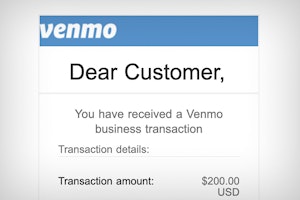
Selling on Facebook Marketplace? Beware of Fake Venmo Emails
Scammers are sending fake Venmo emails to Facebook Marketplace sellers in an attempt to steal login information and money.
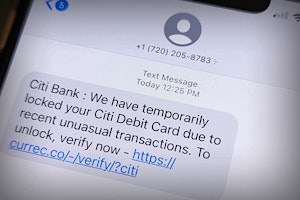
Citibank Text Message Scam: Locked Debit Card Alert Is Fake
If you've received a locked debit card text message from Citibank, it's likely a scam. Don't click on the link and delete the text message.
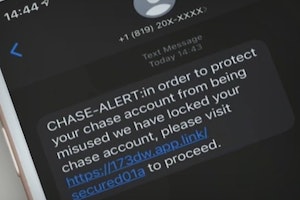
Real Chase Fraud Text Alert or Scam Message?
If you receive a text message from Chase Bank, don't click on any links or call the phone number listed—it could be a scam designed to steal your information and money.

Amex Fraud Text Alert Scams: Spotting a Fraud
If you receive a text message from American Express, don't click on any links or call the phone number listed—it could be a scam designed to steal your information and money.

Citizens Bank Text: Scam or Real Message?
If you received a text message from Citizens Bank asking for personal information such as your password or login credentials, it may be from a scammer trying to steal your money.
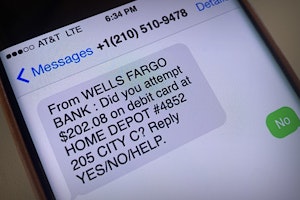
Wells Fargo Text Alert - Is It A Scam?
Dangerous text message scams are targeting Wells Fargo customers. These text message alerts for Zelle transactions or purchases with retailers are scams.
Guides To Protect Against Postal & Delivery Services Scams

6 Common FedEx Scams Meant to Steal Your Info & Money
Stay cautious when you receive unexpected text messages or emails from FedEx—they could be fake messages being sent from scammers in an attempt to steal from you.

5 Holiday Scams Waiting to Steal Your Joy This Season
Whether you donate to a charity this season or buy your family a new puppy, scammers are eagerly waiting to trick you into giving up your personal information in these holiday scams.

7 Easy & Effective Ways to Stop Porch Pirates
With online shopping on the rise, these 7 tips and tricks can help you stop porch pirates from stealing your packages this holiday season.

How to Get Verified on TikTok
Securing that little blue checkmark can mean brand collabs, sponsorship opportunities, or protecting your unique content from impersonators.

How to Tell if Nikes Are Fakes: From Tags to the Stitching
Nike is one of the biggest brands targeted by counterfeiters and scammers - be extra careful with Nike products from non-official retailers as you could end up with a fake
News About Postal & Delivery Services Scams

Urgent CDC Warning: Eye Drops Linked to 3 Deaths, Loss of Vision
The CDC is warning eye drops users of a rare bacterial infection from 2 brands of eye drops. The infection is resistant to antibiotics and has resulted in the loss of vision, loss of eyeballs and the death of 3 patients.

Banks May Refund More Zelle Scam Victims in 2023
Zelle scams have reached a serious volume. New reports suggest that banks are looking at new refund protections for customers in 2023.

Optus Data Breach - One of the Worst Cyberattacks in Australia
Hackers have gained access to 9.8 million customer records from Optus in Australia, exposing personal information such as driver licence, medicare and passport details.

Roe vs. Wade Overturned: Abortion Rights in Your State
Find out what the overturning of Roe vs. Wade means for abortion rights in your state.
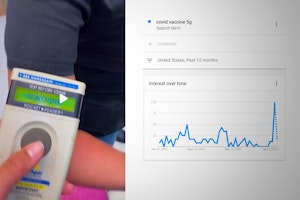
Searches for "COVID Vaccine 5G" Hit All-Time High, But Microchips Definitely Not in Vaccine
The number of people searching for the term "COVID vaccine 5G" on Google has just hit an all-time high, but there's one way to be sure that there are no microchips.



